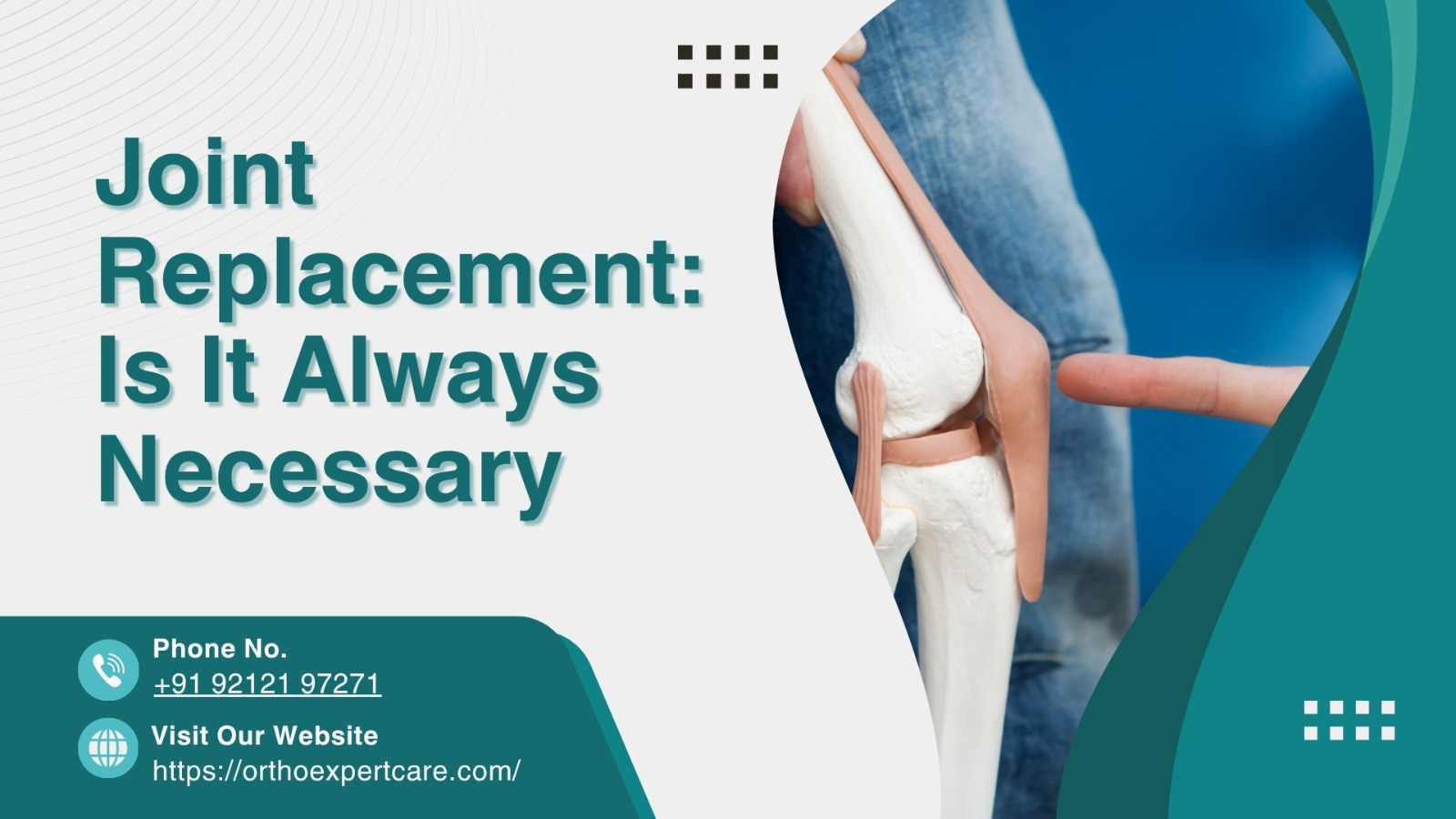Joint health plays a vital role in maintaining mobility and an active lifestyle. When joints become painful, stiff, or swollen due to conditions like osteoarthritis, injury, or age-related wear and tear, many individuals immediately consider joint replacement. While this surgical option can be life-changing, it isn’t always necessary. According to Dr. Ajay Mittal, a renowned orthopedic specialist, there are several non-surgical strategies that can manage joint pain effectively and improve quality of life.
Understanding when Joint Replacement is truly required versus when non-surgical approaches are sufficient is crucial. Early intervention often reduces the need for invasive procedures and allows patients to maintain an active and independent lifestyle.
What is Joint Replacement?
Joint Replacement is a surgical procedure in which a damaged joint is replaced with an artificial one. It is most commonly performed for hips, knees, shoulders, and sometimes elbows. The surgery is typically recommended for patients who experience severe pain, limited mobility, or joint deformities that significantly affect daily life.
However, surgery comes with inherent risks such as infection, blood clots, and prolonged recovery periods. Therefore, determining whether Joint Replacement is truly necessary should be done carefully, with input from an experienced orthopedic specialist like Dr. Ajay Mittal.
Signs You Might Need Joint Replacement
While not all joint pain requires surgery, certain signs may indicate that Joint Replacement is necessary:
- Persistent pain that interferes with daily activities and sleep.
- Significant loss of joint function and mobility.
- Advanced osteoarthritis or cartilage loss confirmed by imaging.
- Non-surgical interventions like physiotherapy, medications, or injections provide minimal relief.
Dr. Ajay Mittal often stresses that a proper evaluation, including X-rays, MRIs, and clinical assessment, is essential before deciding on Joint Replacement.
Non-Surgical Alternatives to Joint Replacement
For many patients, non-surgical treatments can delay or even prevent the need for Joint Replacement. These methods focus on relieving pain, improving joint function, and enhancing overall quality of life.
1. Physical Therapy and Exercise
Targeted exercises can strengthen the muscles around the joints, enhance flexibility, and reduce pain. Non-surgical joint treatments like physiotherapy focus on improving stability and mobility, making daily activities easier. Dr. Ajay Mittal recommends customized exercise plans tailored to individual needs, which can significantly delay the need for surgery.
Benefits:
- Reduces joint pain
- Improves range of motion
- Strengthens muscles supporting the joints
2. Medications and Injections
Medications, including anti-inflammatory drugs and pain relievers, can manage mild to moderate joint pain. In addition, injections like corticosteroids or hyaluronic acid can provide temporary relief, reduce inflammation, and improve joint lubrication. These treatments are often part of a comprehensive plan to manage osteoarthritis and may help avoid Joint Replacement for some patients.
3. Lifestyle Modifications
Simple lifestyle changes can have a significant impact on joint health:
- Weight management: Reducing body weight decreases stress on weight-bearing joints like knees and hips.
- Nutrition: A diet rich in calcium, vitamin D, and anti-inflammatory foods supports joint health.
- Low-impact activities: Swimming, cycling, and walking help maintain mobility without stressing the joints.
Dr. Ajay Mittal emphasizes that combining lifestyle changes with other non-surgical approaches can lead to long-lasting relief.
4. Supportive Devices
Braces, orthotics, and walking aids are often recommended as part of non-surgical joint treatments. These devices provide stability, reduce pain, and prevent further joint damage. Many patients find that such devices allow them to maintain their independence and delay Joint Replacement surgery.
5. Alternative Therapies
Some patients benefit from complementary therapies such as acupuncture, hydrotherapy, or massage therapy. While these approaches may not replace medical treatment, they can contribute to joint pain relief without surgery when used alongside other methods.
The Role of Early Detection
One of the most important factors in avoiding unnecessary Joint Replacement is early detection and intervention. Patients who seek advice at the first signs of joint pain can often benefit from non-surgical joint treatments before the condition progresses. Dr. Ajay Mittal notes that early management not only improves outcomes but also reduces long-term healthcare costs and recovery time.
FAQs
Q1: Can joint pain be fully treated without surgery?
Yes. Many patients experience significant relief through non-surgical joint treatments, physiotherapy, lifestyle changes, and medications, especially when addressed early.
Q2: How effective are injections for joint pain relief?
Injections like corticosteroids or hyaluronic acid can provide temporary relief and improve joint function, often delaying the need for Joint Replacement.
Q3: What lifestyle changes can prevent or delay the need for joint surgery? Maintaining a healthy weight, eating a balanced diet, regular low-impact exercise, and avoiding joint overuse are key preventive strategies.
Q4: When should I consult Dr. Ajay Mittal about Joint Replacement?
If joint pain affects your daily life, sleep, or mobility despite non-surgical treatments, it is time to seek expert advice.
Q5: Are non-surgical treatments suitable for everyone?
While most patients benefit from non-surgical approaches, individual evaluation is essential. Dr. Ajay Mittal can design a personalized treatment plan based on your condition.
Conclusion
While Joint Replacement can transform lives for patients with advanced joint disease, it is not always the first or only solution. Non-surgical joint treatments, osteoarthritis management strategies, and joint pain relief without surgery offer effective ways to maintain mobility and reduce discomfort. Dr. Ajay Mittal emphasizes that early intervention, proper evaluation, and a personalized treatment plan can often prevent or delay the need for surgery.
Consult Dr. Ajay Mittal to explore effective non-surgical options and determine whether Joint Replacement is truly necessary for you. Schedule your appointment today and take the first step toward pain-free movement, improved mobility, and a better quality of life!
